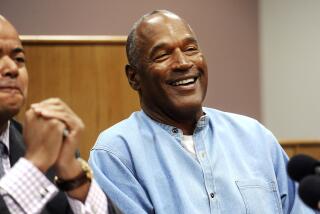Simpson’s past could affect trial
- Share via
LAS VEGAS — O.J. Simpson’s past legal woes surfaced Tuesday in his robbery-kidnap trial here as prosecutors tried to revisit a civil judgment that held Simpson liable for the 1994 deaths of his ex-wife and her friend.
Simpson was acquitted in the slayings of Nicole Brown Simpson and Ronald Goldman, but in 1997 a civil jury issued a $33.5-million judgment against the NFL Hall of Famer. On Tuesday, prosecutors attempted to call Goldman’s father’s attorney to the stand -- a move met with hours of defense protests and an unsuccessful bid for a mistrial.
Outside the jury’s presence, Judge Jackie Glass listened to testimony from attorney David Cook, who represents Fred Goldman, to determine whether Cook could be called as a witness. Tuesday’s proceedings ended without a decision from Glass on the matter.
A San Francisco debt collection specialist, Cook has aggressively pursued Simpson’s assets. He helped the Goldman family seize control of Simpson’s “hypothetical confessional” book about the murders, “If I Did It: Confessions of the Killer,” which became a bestseller after his Las Vegas arrest.
Simpson attorney Yale Galanter said Cook’s testimony would merely remind the jury of Simpson’s decade-old, headline-dominating turns in court.
“I think it has no relevance to this case,” said Galanter, whose voice steadily rose as the attorneys sparred outside the presence of jurors.
But prosecutors contend that the seeds of Simpson’s troubles here -- he is charged with a dozen crimes, including kidnapping and armed robbery -- were planted shortly after the civil verdict. Simpson associates hid plaques, footballs and other mementos from the court, recordings played for jurors indicate.
The Goldmans are repeatedly mentioned on secret recordings of Simpson, and witnesses testified that he referred to them as the “gold diggers.”
Simpson’s attorneys said that the memorabilia at issue in the case were stolen from their client and that on Sept. 13, 2007, he and five associates tried to get the items back from two dealers. Prosecutors, however, said Simpson’s group robbed the dealers at gunpoint.
Simpson, the recordings show, mistakenly expected that his former agent, Mike Gilbert, would be at the Palace Station Hotel & Casino on the day of the confrontation. Gilbert had hidden some of Simpson’s items, Clark County Dist. Atty. David Roger told the court, and Simpson’s ire toward him was “one of the motives for robbery.”
Earlier in the day, the defense scored a tactical win when Glass essentially allowed the jury to hear the maximum sentence -- life in prison -- that Simpson could face if convicted. Information about a defendant’s potential sentence is typically kept from the jury.
The ruling concerned a former codefendant, Charles Ehrlich, who agreed to plead guilty to lesser charges in exchange for his testimony. Defense attorneys enumerated the charges initially filed against Ehrlich -- which he said more than once were identical to Simpson’s.
Ehrlich, a longtime Simpson friend, has testified that he was to pose as a buyer to retrieve some of Simpson’s mementos from the two collectibles dealers. His account Monday was the first to directly contradict Simpson’s contention that he never saw guns in the hotel room.
“Put the gun away,” Ehrlich quoted Simpson as saying to one of their associates. Ehrlich repeated the phrase several times in his testimony, though he sometimes changed “gun” to “guns.”
--
harriet.ryan@latimes.com
More to Read
Sign up for Essential California
The most important California stories and recommendations in your inbox every morning.
You may occasionally receive promotional content from the Los Angeles Times.














